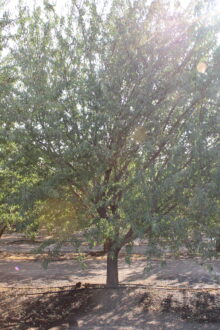Western SARE funded two Sustainable Agriculture Action Plan (SAAP) grants for a total of $50,000. The funding is intended for projects leading a consultative process and creating a Sustainable Agriculture Action Plan that documents the research, regulatory, infrastructure, and educational needs and priorities required to increase sustainable agriculture practices in a specific industry/commodity or geographical location.
Food Safety Barriers to Climate-Smart Agriculture Adoption
Community Environmental Council, CA
According to project leader Bre Sliker, the agricultural community along California's southern Central Coast has a growing interest in sustainable agriculture and climate-smart practices. However, farmers and ranchers often hesitate to implement Natural Resource Conservation Service (NRCS) Conservation Practices, such as compost application, hedgerows, and cover crops, due to perceived concerns that these sustainable practices will increase their food safety risks. With guidance and regulations coming from various (and often conflicting) sources, agencies, and buyers, there's a need for a unified message that addresses common conservation practices and their associated food safety risks.
To address this, the Community Environmental Council (CEC) and the Central Coast Soil Hub (CCSH) will develop a location-focused Sustainable Agriculture Action Plan. This plan will gather stakeholder feedback to determine where food safety and sustainability are in conflict, identify which of these conflicts pose the greatest barriers to advancing sustainable agriculture, and suggest a path forward to resolve these conflicts. The project will support farmers and ranchers in the Tri-County Area of California's Central Coast, specifically San Luis Obispo, Santa Barbara, and Ventura counties, as well as the region's four RCD offices. Although the region hosts diverse agricultural operations, this initiative will focus on fresh produce growers and their heightened food safety challenges.
The roadmap developed by this plan will benefit farmers and the rest of the community by providing actionable recommendations to increase sustainable practice adoption. Farmers should no longer be forced to choose between safety and sustainability.
Industry-focused sustainable agriculture action plan for regenerative almond practices in California
UC Davis, CA
According to project leader Sat Darshan S. Khalsa, California's almond industry faces significant challenges in scaling sustainable practices. As demand for regenerative agriculture grows, the need for a coherent and actionable framework specific to regenerative almond farming becomes critical. The Sustainable Agriculture Action Plan will provide clear, science-based guidelines and practices to enhance the sustainability of almond farming.
The primary challenge is the fragmented approach to regenerative practices, lacking a unified industry-wide strategy. This fragmentation is problematic for almonds as a tree crop, requiring adaptations of traditional regenerative principles. This complexity hinders effective implementation and scalability, making it difficult for stakeholders such as researchers, agtech companies, technical advisors, growers, processors, and handlers to efficiently adopt these practices. Without a comprehensive plan, efforts to scale regenerative practices can lead to suboptimal outcomes, impacting the long-term viability of almond farming. The plan will offer a detailed, research-driven roadmap aligned with the latest scientific findings and best practices in regenerative agriculture. By treating regenerative agriculture as a spectrum, the plan allows for varying degrees of adoption, enabling growers to evolve their practices progressively.
The SAAP will unify the industry under a common goal of sustainability, provide a science-based framework for action, and facilitate a smoother transition to regenerative practices, ensuring the long-term success and sustainability of the California almond industry.
